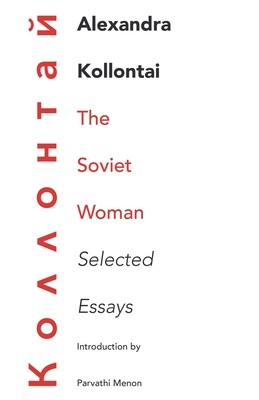
- We will send in 10–14 business days.
- Author: Alexandra Kollontai
- Publisher: LeftWord Books
- Year: 2017
- Pages: 166
- ISBN-10: 9380118635
- ISBN-13: 9789380118635
- Format: 14 x 21.6 x 0.9 cm, minkšti viršeliai
- Language: English
- SAVE -10% with code: EXTRA
Reviews
Description
The revolutionary legacy of Alexandra Kollontai (1872-1952) has slipped into relative obscurity. This is somewhat surprising, because she was a voluminous writer - on politics, Marxist theory, country-specific economic studies, and the women's question. She left letters, diaries, memoirs and pamphlets, theoretical tracts, articles, and creative literature. She authored two novels, The Love of Worker Bees and Red Love, which explored issues of love and socialist morality. Kollontai was resolutely opposed to bourgeois feminism, the term used to demarcate a form of feminism that was anti-Marxist and that drove an agenda of free love. She was, however, perhaps the only one amongst a small group of women and men communists in her time who engaged intellectually with issues of sexual morality in the context of women's liberation. She envisioned the many possibilities for women's freedom that lay locked in a socialist future, and set out the mechanisms by which women's subordination - political and economic of course, but equally in terms of ideas and attitudes - could and must be undone under socialism. This volume brings together some of her most important writings on gender, sexuality and women's liberation.
EXTRA 10 % discount with code: EXTRA
The promotion ends in 23d.06:43:20
The discount code is valid when purchasing from 10 €. Discounts do not stack.
- Author: Alexandra Kollontai
- Publisher: LeftWord Books
- Year: 2017
- Pages: 166
- ISBN-10: 9380118635
- ISBN-13: 9789380118635
- Format: 14 x 21.6 x 0.9 cm, minkšti viršeliai
- Language: English English
The revolutionary legacy of Alexandra Kollontai (1872-1952) has slipped into relative obscurity. This is somewhat surprising, because she was a voluminous writer - on politics, Marxist theory, country-specific economic studies, and the women's question. She left letters, diaries, memoirs and pamphlets, theoretical tracts, articles, and creative literature. She authored two novels, The Love of Worker Bees and Red Love, which explored issues of love and socialist morality. Kollontai was resolutely opposed to bourgeois feminism, the term used to demarcate a form of feminism that was anti-Marxist and that drove an agenda of free love. She was, however, perhaps the only one amongst a small group of women and men communists in her time who engaged intellectually with issues of sexual morality in the context of women's liberation. She envisioned the many possibilities for women's freedom that lay locked in a socialist future, and set out the mechanisms by which women's subordination - political and economic of course, but equally in terms of ideas and attitudes - could and must be undone under socialism. This volume brings together some of her most important writings on gender, sexuality and women's liberation.


Reviews